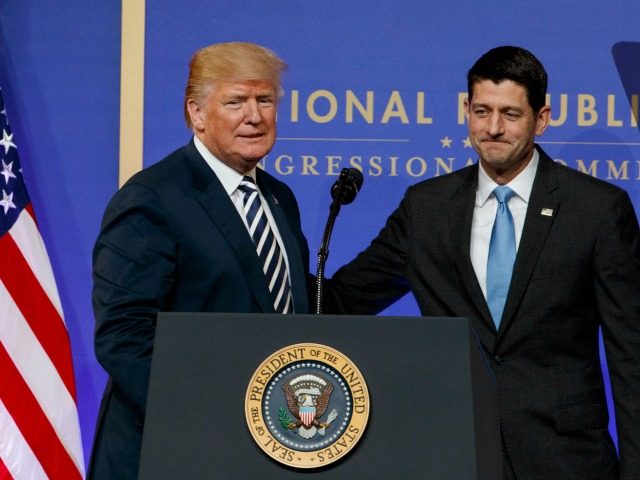House Speaker Paul Ryan described President Donald Trump’s four-part immigration reform as “extremely reasonable,” marking a rhetorical shift as he tries to keep his party’s amnesty caucus from alienating too many populist voters before the November chances.
Ryan said:
I agree with his principles. I think the President made a good-faith effort. Moving to a merit-based system is in the interests of our country, our economy. A lottery makes no sense and converting a lottery into a merit-based system make a lot of sense. Securing our border really makes a lot of sense and then having certainty for the DACA students so that they have certainty. All of those things make sense. He was extremely reasonable in putting those pillars out there. .. the President has been extremely reasonable.
That’s a big rhetorical shift from his May 11 press conference when Ryan notably ignored Trump’s call in his State of the Union speech to replace the current visa lottery and chain-migration inflows with a merit-based review for would-be legal immigrants. Trump also offered a huge amnesty-wave of roughly 2 million foreign workers to win support from business groups and the Democrats.
On May 11, Ryan said only “we want to fix this DACA problem, we want certainty, and we have a border security problem that needs to be addressed. These should not be mutually exclusive goals.”
But Ryan’s rhetorical shift has not stopped him from working with a group of business-first Republicans who are allying with Democrats to pass a quick, no-strings amnesty via the discharge-petition process. The push is led by so-called “moderate” Republicans — many of whom vociferously opposed Trump in 2016 — with the open support of business groups such as the U.S. Chamber of Commerce and FWD.us, and most reporters in the establishment media.
The push is very unpopular among GOP voters and swing-voters. Those voters are sympathetic to migrants, but polls show they overwhelmingly prefer federal immigration policy help Americans get good jobs before allowing companies to import more cheap workers and more consumers.
Ryan has the political power to shut down the unpopular cheap-labor push, but he also has built a 2018 campaign machine that relies on funding from the companies and donors who favor the current federal policy of growing the economy via the mass immigration of new consumers and cheap workers. So far, Ryan has applied little or no pressure against the 20 GOP co-signers of the petition, which just needs 25 GOP votes to let Democrats trigger passage of a vote and amnesty.
In fact, Politico reported May 17 that Ryan’s campaign machine is aiding at least three of the discharge-petition Republicans:
The field offices have become the envy of the House Republican Conference. While [the Congressional Leadership Fund] CLF is not allowed to discuss its efforts with members and candidates under campaign law, lawmakers have taken notice and tried to signal a desire for help.
This week, CLF will announce three new offices, one each for vulnerable Reps. John Faso of New York and Fred Upton of Michigan and a third in Minnesota, where the party is vying for an open seat being vacated by retiring Democratic Rep. Rick Nolan.
“I welcome any help I can get,” said Rep. David Valadao (R-Calif.). Clinton carried his Central Valley district by 15 points, and CLF has set up a field office there.
That support reflects Ryan’s long history of supporting “any willing worker” policies which allow companies to hire cheap foreign employees instead of middle-class Americans.
Instead of requiring the GOP’s business-first groups to support their populist voters, Ryan is now eyeing a bill that would pick up some votes from Democrats while losing some GOP votes, likely from GOP populists. He told reporters:
So the question is, could we have a bill that has a vast majority of Republicans that some Democrats would support. What’s the combination?
Ryan and Majority Leader Kevin McCarthy are struggling to reconcile the rival factions — and President Trump — while also preserving McCarthy’s chances of replacing Ryan after a GOP victory in November.
Meanwhile, Trump is still pushing his four-part reforms, despite demands by business for additional immigration to offset growing pressure for wage increases.
Trump’s focus on migration — both legal and illegal — is popular, likely to spike GOP turnout in 2018 — and is hated by business groups, including the Koch brothers’ donor network of stock investors, CEOs, and real-estate companies
Trump “still believes the things he believed before … the president has not changed his opinion, his principles, his pillars,” said Ryan.
However, business pressure is pushing Trump to focus on the creation of new jobs — even jobs to be filled by migrants — instead of touting the need for GOP-aligned employers to raise voters’ wages by November.
In February, Sen. Mitch McConnell used the Senate’s 60-vote threshold to deadlock the pro-American and cheap-labor factions in the Senate’s GOP caucus.
McConnell’s four-vote debate allowed a group of cheap-labor Republicans to vote for a double-amnesty and then vote for the President’s immigration plans, while the Democrats’ block of roughly 45 pro-migration Senators ensured Trump’s pro-employee priorities did not defeat business’ priorities. Roughly 20 of the GOP Senators voted against Trump’s priorities in two votes. Since that vote, GOP and Democratic Senators have dropped the subject from conversations.
But Ryan faces a more difficult problem because he cannot easily arrange a deadlock in the House that would temporarily defuse the conflict between his majority of populist voters and pro-migration business donors — and because he is not willing to force the pro-business faction to accept a pro-voters win by the caucus’ majority of populists.

COMMENTS
Please let us know if you're having issues with commenting.